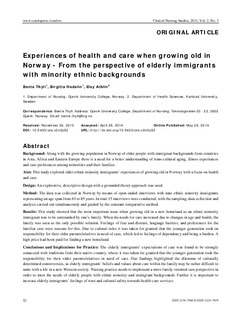| dc.contributor.author | Thyli, Bente | |
| dc.contributor.author | Hedelin, Birgitta | |
| dc.contributor.author | Athlin, Elsy | |
| dc.date.accessioned | 2015-02-11T09:16:01Z | |
| dc.date.available | 2015-02-11T09:16:01Z | |
| dc.date.issued | 2014 | |
| dc.identifier.citation | Thyli, B., Hedelin, B. & Athlin, E. (2014) Experiences of health and care when growing old in Norway - From the perspective of elderly immigrants with minority ethnic backgrounds. In: Clinical Nursing Studies, 2(3), p. 52-63. | nb_NO |
| dc.identifier.issn | 2324-7959 | |
| dc.identifier.uri | http://hdl.handle.net/11250/275823 | |
| dc.description | This article is designed as ”Open Access”. This is the journal's PDF originally published in Clinical Nursing Studies, http://dx.doi.org/10.5430/cns.v2n3p52 | nb_NO |
| dc.description.abstract | Background: Along with the growing population in Norway of older people with immigrant backgrounds from countries
in Asia, Africa and Eastern Europe there is a need for a better understanding of trans-cultural aging, illness experiences
and care preferences among minorities and their families.
Aim: This study explored older ethnic minority immigrants’ experiences of growing old in Norway with a focus on health
and care.
Design: An explorative, descriptive design with a grounded theory approach was used.
Method: The data was collected in Norway by means of open-ended interviews with nine ethnic minority immigrants
representing an age span from 63 to 85 years. In total 15 interviews were conducted, with the sampling, data collection and
analysis carried out simultaneously and guided by the constant comparative method.
Results: This study showed that the most important issue when growing old in a new homeland as an ethnic minority
immigrant was to be surrounded by one’s family. When the needs for care increased due to changes in age and health, the
family was seen as the only possible solution. Feelings of fear and distrust, language barriers, and preferences for the
familiar care were reasons for this. Due to cultural rules it was taken for granted that the younger generation took on
responsibility for their older parents/relatives in need of care, which led to feelings of dependency and being a burden. A
high price had been paid for finding a new homeland.
Conclusions and Implications for Practice: The elderly immigrants’ expectations of care was found to be strongly
connected with traditions from their native country, where it was taken for granted that the younger generation took the
responsibility for their older parents/relatives in need of care. Our findings highlighted the dilemma of culturally
determined controversies, as elderly immigrants’ beliefs and values about care within the family may be rather difficult to
unite with a life in a new Western society. Nursing practice needs to implement a more family-oriented care perspective in
order to meet the needs of elderly people with ethnic minority and immigrant backgrounds. Further it is important to
increase elderly immigrants’ feelings of trust and cultural safety towards health-care services. | nb_NO |
| dc.language.iso | eng | nb_NO |
| dc.publisher | Sciedu Press | nb_NO |
| dc.rights | Navngivelse 3.0 Norge | * |
| dc.rights.uri | http://creativecommons.org/licenses/by/3.0/no/ | * |
| dc.subject | care preferences | nb_NO |
| dc.subject | elderly immigrants | nb_NO |
| dc.subject | ethnic minorities | nb_NO |
| dc.title | Experiences of health and care when growing old in Norway - From the perspective of elderly immigrants with minority ethnic backgrounds | nb_NO |
| dc.type | Peer reviewed | nb_NO |
| dc.type | Journal article | nb_NO |
| dc.subject.nsi | VDP::Medical disciplines: 700::Health sciences: 800::Nursing science: 808 | nb_NO |
| dc.subject.nsi | VDP::Medical disciplines: 700::Clinical medical disciplines: 750::Geriatrics: 778 | nb_NO |
| dc.source.pagenumber | 3 | nb_NO |
| dc.source.volume | 2 | nb_NO |
| dc.source.journal | Clinical Nursing Studies | nb_NO |
| dc.identifier.doi | 10.5430/cns.v2n3p52 | nb_NO |
| dc.relation.project | 52-63 | nb_NO |

